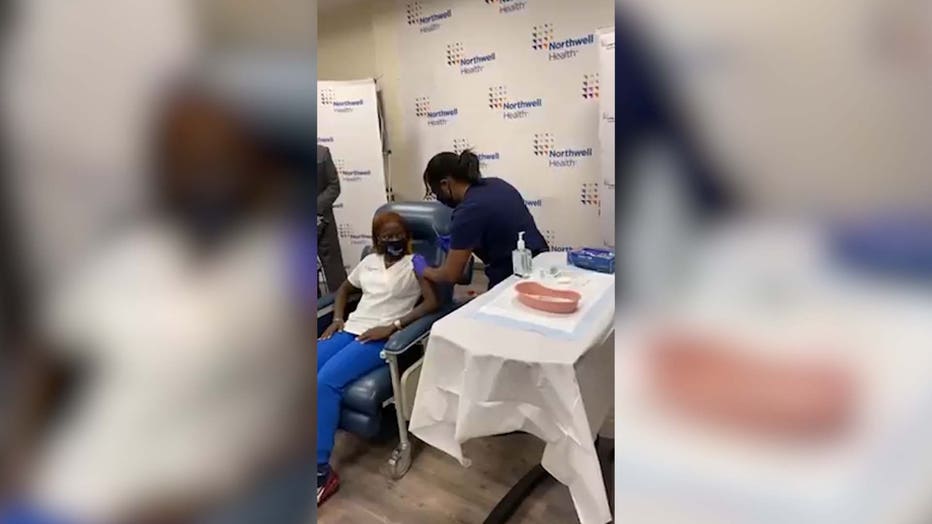Video: 1st American to receive COVID-19 shot gets booster
1st American COVID-19 vaccine recipient gets booster shot in New York
Intensive care unit nurse Sandra Lindsay, the first person in the United States to receive a COVID-19 vaccine, got her booster shot at New York’s Northwell Long Island Jewish Medical Center on Oct. 6. (Credit: Michael H Goldberg/@michaelhgoldberg via Storyful)
NEW YORK - The first American to receive the COVID-19 vaccine in 2020 got her booster shot Wednesday.
Sandra Lindsay, who works as an intensive care nurse, was the first person to get a COVID-10 vaccine in the United States when it first became available to health care workers and nursing home residents last year.
Lindsay received her booster at New York’s Northwell Long Island Jewish Medical Center, the same place she received her first dose in December of 2020.
"I feel hopeful today. Relieved," Lindsay said when she got her first dose of the COVID-19 vaccine.

FILE - Sandra Lindsay receives her COVID-19 booster shot.
RELATED: NYC critical care nurse first to receive coronavirus vaccine in U.S.
New York Gov Kathy Hochul announced a booster rollout plan for the state on Sept. 27.
"A booster dose of the COVID-19 vaccine will help particularly at-risk New Yorkers stay protected from the virus for longer," Hochul said in a press release. "While the focus of our vaccination effort remains ensuring all unvaccinated New Yorkers get vaccinated, those who are booster eligible should waste no time receiving maximum protection from COVID-19 as soon as possible."
The U.S. launched a campaign to offer boosters of Pfizer’s COVID-19 vaccine to millions of Americans on Sept. 24 even as federal health officials stressed the real problem remains getting first shots to the unvaccinated.
"We will not boost our way out of this pandemic," warned Dr. Rochelle Walensky, director of the Centers for Disease Control and Prevention — even though she took the rare step of overruling the advice of her own expert panel to make more people eligible for the booster.
RELATED: Johnson & Johnson seeks FDA approval of COVID-19 booster shot
The vast majority of COVID-19 cases and hospitalizations are among the unvaccinated, Walensky noted. And all three COVID-19 vaccines in the U.S. offer strong protection against severe illness, hospitalization and death despite the extra-contagious delta variant that caused cases to soar. But immunity against milder infection appears to wane months after the initial vaccination.
Last month, the U.S. Food and Drug Administration authorized booster shots of Pfizer’s vaccine for older Americans and other groups with heightened vulnerability to COVID-19. It’s part of a sweeping effort by the Biden administration to shore up protection amid the delta variant and potential waning vaccine immunity.
Government advisers backed the extra Pfizer shots, but they also worried about creating confusion for tens of millions of other Americans who received the Moderna and J&J shots. U.S. officials don’t recommend mixing and matching different vaccine brands.
Pfizer and Moderna have provided the vast majority of U.S. COVID-19 vaccines. More than 170 million Americans have been fully vaccinated with the companies’ two-dose shots while less than 15 million Americans got the Johnson & Johnson shot.
RELATED: COVID-19 booster side effects similar to those after 2nd vaccine dose, CDC study finds
J&J asked the FDA on Tuesday to allow extra shots of its COVID-19 vaccine as the U.S. government moves toward expanding its booster campaign to millions more vaccinated Americans.
J&J said it filed a request with the FDA to authorize boosters for people 18 and older who previously received the company’s one-shot vaccine. While the company said it submitted data on several different booster intervals, ranging from two to six months, it did not formally recommend one to regulators.
The Associated Press and Storyful contributed to this report.

